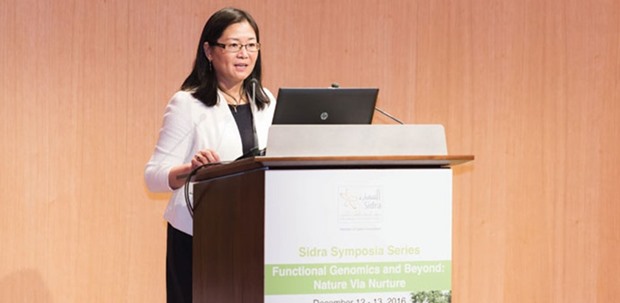The Qatar Genome Programme (QGP) will complete the genome sequencing in three phases, a top official has revealed.
“The QGP aims to sequence thousands of genome samples from Qataris. Statistically and scientifically, sequencing of 10% of the population is good enough,” said Ena Wang, the chief of the Translational Medicine Division at Sidra Medical and Research Center (Sidra), yesterday.
Speaking on the sidelines of the “Functional Genomics and Beyond: Nature via Nurture, the Sidra Symposia Series”, Wang explained that Sidra is one of the main contributors to the Qatar Genome Programme.
“Sidra provides the infrastructure to support the data generation. We are not only involved in the initiation of the programme, we also take the lead in data generation,” she said.
“We have already sequenced more than 3,400 samples in the first phase and we are moving to the second phase with sequencing of another 3,000 samples,” Wang added. “The Biobank collects the samples of Qatari genomes as well as genomes of long-time residents in the country. However, we are only sequencing the genomes of Qataris at present.”
“Qatar Biobank aims to complete the collection of 60,000 samples of both the nationals and residents in the near future,” she said.
According to the official, the sequencing of the genomes will lead to the development of precision medicine.
“The QGP will give us an understanding of the basic structure of the genetic variants. Those are common variants as well as ethnicity-related variants or some of the disease and risk variants which are unique to this population,” Wang said.
“This will give us an understanding of the genetic landscape of the population. It will facilitate knowledge generation as well as very rich information for the future leading to early disease prevention and possibilities for screening for various diseases,” she continued.
Wang said that all the sequencing will take place in Sidra.
“The genome sequencing needs specialised instruments which are available only in Sidra at present. This is not available anywhere else in the Gulf region,” Wang added.
“We do have the largest capacity and reasonable cost and very unique facility. Sidra has a centralised biorepository. The large majority of the samples are stored in Qatar Biobank,” the official said.
“Sidra will take the isolated ones and process them for the sequencing. We will soon be able to get the outcomes of the first phase of 3,000 data that will give us the basic knowledge about several facts about the population,” Wang explained.
“Most probably, we will get it early 2017. The additional data will be compared to this. It is very critical to have this 3,000 normal data which will generate the genetic landscape for the population,” she added.

Ena Wang: The Biobank collects the samples of Qatari genomes as well as genomes of long-time residents in the country. However, we are only sequencing the genomes of Qataris at present.

